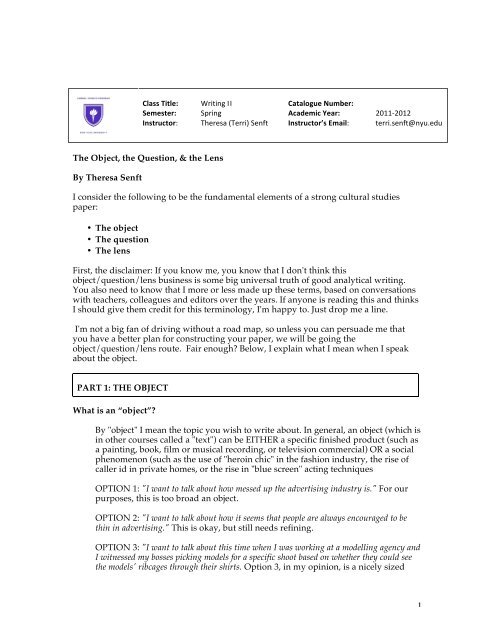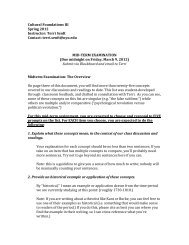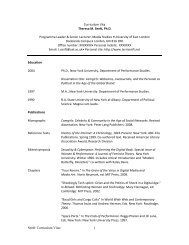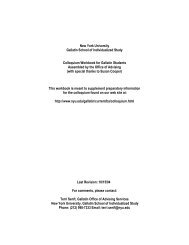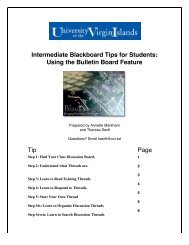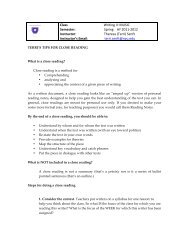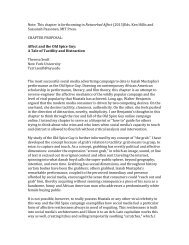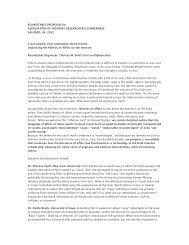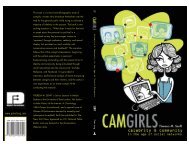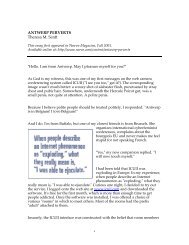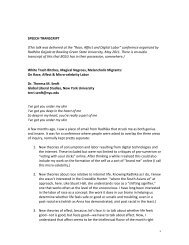The Object, the Question, & the Lens By Theresa Senft I ... - Terri Senft
The Object, the Question, & the Lens By Theresa Senft I ... - Terri Senft
The Object, the Question, & the Lens By Theresa Senft I ... - Terri Senft
You also want an ePaper? Increase the reach of your titles
YUMPU automatically turns print PDFs into web optimized ePapers that Google loves.
Class Title: Writing II Catalogue Number:<br />
Semester: Spring Academic Year: 2011-‐2012<br />
Instructor: <strong>The</strong>resa (<strong>Terri</strong>) <strong>Senft</strong> Instructor’s Email: terri.senft@nyu.edu<br />
<strong>The</strong> <strong>Object</strong>, <strong>the</strong> <strong>Question</strong>, & <strong>the</strong> <strong>Lens</strong><br />
<strong>By</strong> <strong>The</strong>resa <strong>Senft</strong><br />
I consider <strong>the</strong> following to be <strong>the</strong> fundamental elements of a strong cultural studies<br />
paper:<br />
• <strong>The</strong> object<br />
• <strong>The</strong> question<br />
• <strong>The</strong> lens<br />
First, <strong>the</strong> disclaimer: If you know me, you know that I don't think this<br />
object/question/lens business is some big universal truth of good analytical writing.<br />
You also need to know that I more or less made up <strong>the</strong>se terms, based on conversations<br />
with teachers, colleagues and editors over <strong>the</strong> years. If anyone is reading this and thinks<br />
I should give <strong>the</strong>m credit for this terminology, I'm happy to. Just drop me a line.<br />
I'm not a big fan of driving without a road map, so unless you can persuade me that<br />
you have a better plan for constructing your paper, we will be going <strong>the</strong><br />
object/question/lens route. Fair enough? Below, I explain what I mean when I speak<br />
about <strong>the</strong> object.<br />
PART 1: THE OBJECT<br />
What is an “object”?<br />
<strong>By</strong> "object" I mean <strong>the</strong> topic you wish to write about. In general, an object (which is<br />
in o<strong>the</strong>r courses called a "text") can be EITHER a specific finished product (such as<br />
a painting, book, film or musical recording, or television commercial) OR a social<br />
phenomenon (such as <strong>the</strong> use of "heroin chic" in <strong>the</strong> fashion industry, <strong>the</strong> rise of<br />
caller id in private homes, or <strong>the</strong> rise in "blue screen" acting techniques<br />
OPTION 1: "I want to talk about how messed up <strong>the</strong> advertising industry is." For our<br />
purposes, this is too broad an object.<br />
OPTION 2: "I want to talk about how it seems that people are always encouraged to be<br />
thin in advertising." This is okay, but still needs refining.<br />
OPTION 3: "I want to talk about this time when I was working at a modelling agency and<br />
I witnessed my bosses picking models for a specific shoot based on whe<strong>the</strong>r <strong>the</strong>y could see<br />
<strong>the</strong> models' ribcages through <strong>the</strong>ir shirts. Option 3, in my opinion, is a nicely sized<br />
1
object for a paper. Can you see why this would be?<br />
Regarding <strong>the</strong> importance of narrative and your object.<br />
Though <strong>the</strong>re are many exceptions to this rule, most essays require a beginning,<br />
middle and end. Consider <strong>the</strong> following:<br />
Option A: "I want to talk about my internal debate over getting caller ID"<br />
Option B: "I want to talk about how my housemates began screening calls once we got<br />
caller ID installed"<br />
Option C: "I want to talk about caller ID as a dehumanizing phenomenon."<br />
In this case, I would suggest that Options A and B are "strong objects" for us,<br />
whereas Option C is weaker. Why? Because <strong>the</strong> "personal" examples have a logical<br />
trajectory (i.e. "before caller id, after caller id, my thoughts about <strong>the</strong> phenomenon<br />
of caller id") than <strong>the</strong> "universal" example. Also, options A and B will naturally<br />
lead to a discussion of larger social questions.<br />
Please note that I'm NOT saying you can't write in <strong>the</strong> style of Option C. It is just<br />
more difficult to do so. Contrary to what many expository writing teachers believe,<br />
I think it's troublesome to begin with some huge statement and "shrink down" to<br />
<strong>the</strong> particular. To begin an essay with <strong>the</strong> statement "Technology X is<br />
dehumanizing" begs too many questions, from "Dehumanizing for whom?" to<br />
"Who are you to decide what constitutes a 'human' approach?” If you simply<br />
MUST write in <strong>the</strong> style of Option C, I am going to ask you to confer with me first,<br />
to avoid pitfalls.<br />
On situating your narrator vis a vis your object.<br />
Earlier I mentioned when it came to object size, I preferred Option 3, above. That’s<br />
<strong>the</strong> one where someone wrote, "I want to talk about this time when I was working at a<br />
modelling agency and I witnessed my bosses picking models for a specific shoot based on<br />
whe<strong>the</strong>r <strong>the</strong>y could see <strong>the</strong> models' ribcages through <strong>the</strong>ir shirts.<br />
You know what else is good about option 3? It nicely situates <strong>the</strong> narrator of <strong>the</strong><br />
paper. In <strong>the</strong> case of Option 3, we know <strong>the</strong> speaker isn't some Grand Authority;<br />
ra<strong>the</strong>r, he's <strong>the</strong> employee of <strong>the</strong> advertising agency. This is going to affect his<br />
perspective, of course. Also important: a writer may have multiple roles in <strong>the</strong><br />
stories <strong>the</strong>y tell, and this matters hugely.<br />
For instance, in Option 3, we know <strong>the</strong> person is an employee, but he may also be<br />
a student, an aspiring model himself, etc. All of <strong>the</strong>se roles are going to affect what<br />
he sees in his analysis, and what he does not. When you choose your object, you<br />
are going to have to state and explore your position, as well. Again, this is why I<br />
think stories are useful. Stories often include your position as <strong>the</strong> narrator, and destabilize<br />
<strong>the</strong> notion of you as <strong>The</strong> Authority. When you begin with a personal<br />
story, you are taking <strong>the</strong> rhetorical position not of <strong>the</strong> Expert, but of <strong>the</strong> individual<br />
with an incident to share.<br />
2
(Please note: Some will argue that <strong>the</strong>re are HUGE problems with <strong>the</strong> lie of <strong>the</strong><br />
"ordinary person with an ordinary story" routine. <strong>The</strong> biggest problem critics have<br />
with this is that <strong>the</strong> "ordinary person" IS declaring him/herself an expert, just by<br />
<strong>the</strong> ACT writing on a topic. And what's more, s/he protects him/herself in a way<br />
an expert cannot: that is, by hiding behind <strong>the</strong> cover of "hey, I'm just an ordinary<br />
person." If you want to see this in action, check out Rush Limbaugh, for instance,<br />
or pretty much any moron on AM radio.<br />
I agree with this critique. Still, for our purposes, I still think <strong>the</strong> "ordinary person"<br />
approach is <strong>the</strong> way to go, particularly since we WILL be interrogating our own<br />
perspectives vis a vis our "question", which I will discuss in a moment.<br />
Regarding <strong>the</strong> size of your object<br />
As a general rule of thumb, <strong>the</strong> smaller <strong>the</strong> object, <strong>the</strong> more controllable your<br />
paper will be. Consider <strong>the</strong> following options and our comments, below:<br />
OPTION 1: "I want to talk about how dangerous surveillance is."<br />
OUR COMMENT: For our purposes, this is too broad an<br />
object for a paper.<br />
OPTION 2: "I want to talk about <strong>the</strong> government gets more and more<br />
information about us every day.”<br />
OUR COMMENT: This is okay, but still needs refining.<br />
OPTION 3: "I want to talk about how <strong>the</strong> New York City Metrocard can be<br />
used to track people, and asking whe<strong>the</strong>r we want our<br />
government to be monitoring its citizens in that way.”<br />
OUR COMMENT: Option 3 is a nicely sized object for a<br />
paper. Can you see why this would be?<br />
When you have more than one object: Comparing and Contrasting<br />
Sometimes, it is helpful to write a paper using not one object, but two, or even three<br />
objects in a similar category. “Compare and contrast” is a common technique in<br />
cultural studies. When you compare and contrast two objects, you are asking two<br />
straightforward questions:<br />
• What do <strong>the</strong>se two things have in common? This is generally a matter of<br />
explanation and listing (i.e. both are video games, both came as a result of a<br />
corporate merger, etc.)<br />
• How do <strong>the</strong>se two things differ? Because <strong>the</strong>y are about mechanics (‘how”)<br />
differences between your objects should take MORE of your time to explain than<br />
similarities. Now, <strong>the</strong> truth is, two objects can have an endless number of<br />
similarities and differences. To determine <strong>the</strong> ones you want to focus on, we<br />
need to discuss your question. That’s covered in <strong>the</strong> next task.<br />
3
PART 2: YOUR QUESTION<br />
<strong>The</strong> <strong>Question</strong><br />
After you locate your object, you'll want to come up with your question. For many<br />
of you, your question and your object will be intimately connected. For o<strong>the</strong>rs,<br />
teasing out your question may take some work.<br />
<strong>The</strong> "question" portion of your essay strategy is most easily dealt with by asking<br />
yourself, "What about my object fascinates me? How can I formulate my<br />
fascination as a one or two line interrogation?"<br />
Helpful advice regarding questions<br />
• Use words like “how” or “what” ra<strong>the</strong>r than “why” to form your questions.<br />
Asking “why” generally yields <strong>the</strong> answer, “because,” which gets you nowhere as<br />
a researcher.<br />
• Realize that you won’t have room to tackle more than one question in a short<br />
paper. That said, you will --and should-- have ancillary or<br />
“follow up” questions coming from your big question.<br />
• State your questions as concisely and clearly as possible. This means that<br />
two short sentences are better than one long one.<br />
• Avoid leading questions. For example, “How does <strong>the</strong> Internet lead to <strong>the</strong><br />
collapse of communication?” is an argument masquerading as a question, and is<br />
not acceptable for a proposal.<br />
Some Common Types of <strong>Question</strong>s<br />
Below, we provide four categories of common questions asked in media and<br />
cultural studies. This list is by NO MEANS EXHAUSTIVE. It is meant to spark<br />
your thinking, nothing more. Here are some things you might want to ask of<br />
your objects:<br />
<strong>Question</strong>s of PLACE AND SPACE<br />
1. In what place does my object exist? Where in history, geography, and cultural<br />
memory is it located? How does <strong>the</strong> arrangement of space affect <strong>the</strong> object’s<br />
meaning within culture? Has that space changed over time? What might be <strong>the</strong><br />
signifcance of that change for culture at large?<br />
2. How do <strong>the</strong> particular social groups I am studying come to an understanding of<br />
<strong>the</strong>ir private and <strong>the</strong> public space? <strong>The</strong>ir commercial and ‘free’ space? <strong>The</strong>ir<br />
sacred and <strong>the</strong> secular space?<br />
4
<strong>Question</strong>s of AFFECT and MEMORY<br />
1. What sorts of experiences does my object illicit for its<br />
viewers/participants/bystanders/participants? How does experiential<br />
knowledge change what an object ‘means’ for different populations?<br />
2. What is <strong>the</strong> relationship between an experience of a moment, and <strong>the</strong> re-telling of<br />
it via memory?<br />
<strong>Question</strong>s of IDENTITY and COMMUNITY<br />
1. How have issues of gender, class, nationality, religion, race, age, ability, or<br />
language use functioned in <strong>the</strong> past for <strong>the</strong> group of people I’m interested in<br />
studying? Have <strong>the</strong>re been changes worth noting? What might those changes<br />
signify regarding culture at large?<br />
2. How was legitimate and illegitimate behavior determined in <strong>the</strong> past for those in<br />
<strong>the</strong> group I am studying? Have <strong>the</strong>ir been changes worth noting? How might<br />
those changes tell us something about <strong>the</strong> changing nature of <strong>the</strong> group, or about<br />
culture at large?<br />
<strong>Question</strong>s of PRODUCTION and CONSUMPTION<br />
1. Who has owned <strong>the</strong> means to produce this practice/product/tool in <strong>the</strong> past? Do<br />
different people own it now? If so, have changes in ownership affected what this<br />
practice/product/tool signifies culturally?<br />
2. Who has used this practice/product/tool in <strong>the</strong> past? Do different people use it<br />
now? If so, have changes in consumption affected <strong>the</strong> cultural meanings of this<br />
practice/product/tool?<br />
PART 3: YOUR LENS (ES)<br />
<strong>The</strong> <strong>Lens</strong><br />
After <strong>the</strong> object and <strong>the</strong> question, <strong>the</strong> lens is our final element of paper<br />
preparation. <strong>The</strong> "lens", as I define it, is your demonstration that you know whom<br />
else is thinking in your field. I liked Taylor's description of <strong>the</strong> lens very much. She<br />
wrote:<br />
If <strong>the</strong> object is <strong>the</strong> thing/issue/problem that you want to investigate, <strong>the</strong>n <strong>the</strong> lens is <strong>the</strong><br />
medium through which you choose to view your object, i.e. what <strong>the</strong>ories, etc. "<br />
Consider this: your friend calls herself an innovator, and in a bar she tells you<br />
about her latest cool invention: a disk on which you play music. But when you tell<br />
her that <strong>the</strong> CD has been in production a decade now, she looks baffled, and <strong>the</strong>n<br />
starts talking about how she "can't be expected to know everything." How weird<br />
would that be?<br />
5
Whatever thoughts we are having on any topic, <strong>the</strong> chances are darn good that<br />
somebody else, probably somebody smarter than us, has been thinking about <strong>the</strong>m<br />
somewhere else. It's your job to find those folks, and converse with AT LEAST<br />
ONE of <strong>the</strong>m in your paper. <strong>By</strong> converse, I don't mean ring <strong>the</strong> poor people up. I<br />
mean dialogue with <strong>the</strong>ir ideas.<br />
Finding your <strong>Lens</strong><br />
Remember, anybody smart can have a thought. <strong>The</strong> difference between a random<br />
smart person and a scholar is that a scholar is responsible for knowing WHO ELSE<br />
is thinking along <strong>the</strong> same lines <strong>the</strong>y are.<br />
For your Writing 1 papers, I’ve given you at least two possible <strong>the</strong>orists to use as<br />
lenses. Later on, your professors will want you to begin searching for lenses on<br />
your own. Sometimes, it's hard to know where to begin to look for experts on <strong>the</strong><br />
topic you want to investigate, but that is something you will tackle in Writing 2.<br />
Remember…<br />
Your choice of lens will PROFOUNDLY AFFECT how you see your object. For<br />
instance, Edward Said (famous pro-Palestinean scholar) would write about <strong>the</strong><br />
recent shooting we discussed with a very different lens than would a Pro-Israeli<br />
journalist. Different still might be a recently widowed mo<strong>the</strong>r from <strong>the</strong> West Bank<br />
who just wants all fighting to stop. All of <strong>the</strong>se "authorities" can be found by doing<br />
a web search on <strong>the</strong> incident in question. All of <strong>the</strong>m give vastly different readings<br />
of <strong>the</strong> same reality. This is something we will discuss toge<strong>the</strong>r in our private<br />
meetings. I just wanted to give you a "heads up."<br />
To summarize<br />
<strong>The</strong> "lens", as I define it, is your demonstration that you know whom else is<br />
thinking in your field. Once you find at least ONE person to dialogue with in your<br />
paper on your topic, you safely can say you have your "lens" established.<br />
Remember, you don't need to know everything written about your interests, but you do<br />
need to know *something* beyond your own thoughts.<br />
Now that you are familiar with <strong>the</strong> concepts of <strong>the</strong> object, <strong>the</strong> question and <strong>the</strong> lens, you<br />
are ready to go on to “Writing a cultural studies paper in four easy pieces.”<br />
6


